|
|
 
|
Links to Liberia
Gateway
T
|
Liberian Internet Pages
Click and Go
|
SPECIFICATIONS
|
|
Next Link Page
|
Links in Alphabetic order
[A]
[B]
[C]
[D]
[E]
[F]
[G]
[H]
[I]
[J]
[K]
[L]
[M]
[N]
[O]
[P]
[Q]
[R]
[S]
[T]
[U]
[V]
[W]
[X]
[Y]
[Z]
|
|
Talking Drums Studio

|
We talk peace and progress on seven radio stations in Liberia. We produce news features, dramas, up country news, talk shows, storytelling, Liberian folk songs and programs for women. Our shows promote a "common ground" approach to resolving conflict and finding reconciliation. Our aim is to show that even challenging issues can be examines in ways that inform and entertain, while still promoting the search for solutions.
|
Charles Taylor
Former President
Dankpanah Dr. Charles Ghankay McArthur Taylor
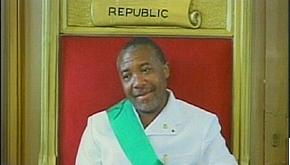
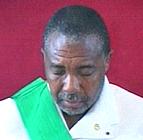
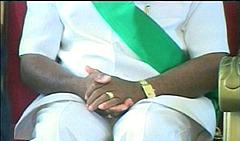
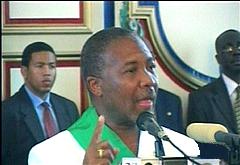
|
President Charles Taylor, blamed for 14 years of bloodshed in Liberia, resigned August 11 2003, and surrendered power to his vice president, Moses Blah. Pushed to resign by the United States and West African leaders, Taylor said at his long-awaited resignation ceremony in Monrovia that history would judge him kindly, beginning his farewell address by exhorting the international community to help Liberia. "We beg of you, we plead with you not to make this another press event. History will be kind to me. I have fulfilled my duties," he said, adding, "I have accepted this role as the sacrificial lamb ... I am the whipping boy." "God willing, I will be back." Indicted for war crimes by a UN-backed tribunal in Sierra Leone, his Swiss bank accounts frozen, his people angry and desperate, his time was up. The executive mansion, like the rest of Liberia, was in ruins, but aides scrounged enough diesel to run the generator, lighting the three chandeliers overhead and casting the chamber, flanked by velvet curtains, in a golden hue. A gospel choir sang Onward Christian Soldiers, followed by the theme song from the film An Officer and a Gentleman. Diplomats, foreign dignitaries and well-wishers packed the audience. Mr Blah, dressed in flowing white robes, a military brass band playing in the balcony. It was pure theatre and the three visiting heads of state, South Africa's Thabo Mbeki, Ghana's John Kufuor, and Mozambique's Joaquin Chissano, had the crucial roles of furnishing gravitas. They praised Mr Taylor's "courageous" and "statesmanlike" decision to step down. Before boarding the plane for Nigeria, Mr Taylor looked back briefly and waved a white handkerchief. Relatives, friends and some government soldiers at the airport cried and waved at Taylor and members of his family as they left.
|
|
Tarty Teh
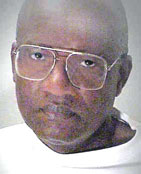
|
Politician/journalist? Mr. Teh's commentaries on Liberian politics and history and accounts of his childhood.
|
|
Elisa Terranova

|
Elisa Terranova was born in 1954 in the country of Liberia, Africa. As her Father's career in the American Foreign Service took root, she traveled extensively abroad, and by 1972 had lived in Africa, Spain, Yugoslavia, Pakistan and France.
|
|
Dr. Togba Nah Tipoteh
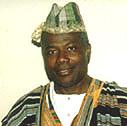
|
Politician: Running candidate for APD - Alliance for Peace and Democracy (LPP-Liberia's People's Party)
at the 2005 Presidential Elections.
Dr. Tipoteh, who inspires many of the opposition figures by remaining at home to be a
principal voice and who continues to work with his exiled colleagues to highlight the collapse of
Liberia as a nation-state. On Friday, July 19, 2002, about a dozen members of President Taylor’s
Anti Terrorist Unit (ATU) raided the home of Dr. Tipoteh without a search warrant or court order
and, of course, without an invitation from Dr. Tipoteh or any member of his family. The purported
reason for the search was for weapons. Mr. Tipoteh's Liberian people's Party (LPP) is a Liberian
Movement for Justice in Africa (MOJA). Founded in 1984, the LPP drew its membership from among a
group of Liberians who called themselves "progressives." Amos Sawyer and H. Boima Fahnbulleh were
founding members of the LPP. Dr. Togbah Nah-Tipoteh was in exile when the LPP was founded. Tipoteh
returned to Liberia in 1990 and in a bizarre fashion took over the leadership of the LPP.
|
|
TLC AFRICA

|
Serving a Global African Audience since 1996 as a global resource for news and information on West Africa,
formerly better known as THE LIBERIAN CONNECTION. Editor and Webmaster is Ciata Victor.
TLC features news - directories - culture - chatrooms - photos - traveltips - background information - events-
and is one of the oldest and best designed Liberia-related sites at the Internet.
|
|
Dr. William R Tolbert Jr.
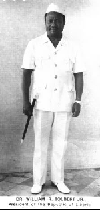
(May 13, 1913 – April 12, 1980)

|
Dr. William R. Tolbert Jr.: President of the Republic of Liberia (1971-1980),
Presented the Family of Man Award in 1976. His Challenge Was Mankind. Upon becoming president with Tubman's death,
Tolbert initiated some liberal reforms and allowed the creation of an opposition party, the Progressive Alliance of
Liberia, the first opposition in 125 years of Liberia's independence. Though reelected in 1975, his government
was criticized sharply for the deep economic disparities between different sectors of the population, notably
the Americo-Liberians, who had dominated the country since independence, and the various indigenous ethnic groups
that constituted the majority of the population. Trained as a civil servant, he entered the country's House of
Representatives in 1943 for the True Whig Party, then the only legal party in the country. He was elected vice
president to William V.S. Tubman in 1955 and served in that position until Tubman's death in 1971.
Upon becoming president with Tubman's death, Tolbert initiated some liberal reforms and allowed the creation of
an opposition party, the Progressive Alliance of Liberia, the first opposition in 125 years of Liberia's independence.
Tensions came to a head in April 1979, when hundreds of protesters marched through the streets of the capital, Monrovia,
demonstrating against the sharp rise in the price of rice. Tolbert ordered his troops to fire on the demonstrators,
and some seventy people were killed. Despite efforts to restore order, rioting ensued throughout Liberia, and attempts
to quash the opposition by arresting its leaders failed.
On April 12, 1980, Tolbert was overthrown and killed in a coup led by Samuel K. Doe, an ethnic Krahn. With his death,
Americo-Liberian domination of the country came to an end.
|
|
MARGARET J. TOR-THOMPSON

|
Running candidate for FAPL -Freedom Alliance Party of Liberia at the 2005 Presidential Elections.
|
|
TransAfrica Forum

|

TransAfrica Forum, established in 1981, provides substantive commentary and scholarship on policy issues related to Africa and the Caribbean and educates the world, in general, and African Americans, in particular, on such topics as human rights, democracy, and global economic policy.
|
|
TRUE WHIG PARTY
|
The True Whig Party, also known as Liberian Whig Party, was Liberia's only legal political party for over 100 years,
from 1878 to the coup d'etat of 1980.
Initially, its ideology was heavily influenced by that of the United States Whig Party.
It presided over a society where only settlers and their descendants were citizens able to vote, and so represented
them, often working in tandem with the Masonic Order. The party endorsed systems of forced labour. In 1930 they
sold human labour to Portuguese colonialists on Fernando Po (now Bioko in Equatorial Guinea), leading to a
five-year U.S. and British boycott of Liberia. Despite this dispute, the West saw them as a stabilising,
unthreatening force and so invested heavily in the nation under William Tubman's leadership (1944–1971).
The party lost power after Tubman's successor, William Tolbert, was killed in an April 1980 coup by forces
opposed to his clampdown on the political opposition and tolerance of corruption. It was then the opposition's
turn to clamp down on the True Whig Party. The vast majority of its members and supporters left the party, but
it struggled on as a minor party.
The party participated in the Liberian elections, 2005 as part of the Coalition for the Transformation of Liberia.
|
|
TSETSE FLIES
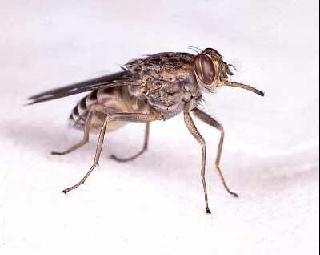
|
Information on tsetse flies, which are spreaders of African trypanosomes, a parasite causing nagana in livestock, a fatal disease of horses and cattle, and sleeping sickness in humans. It also describes the tsetse's appearance, range, and lifecycle.
|
President
William V. S. Tubman
(1944 - 1971)
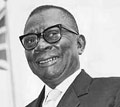
|
William Vacanarat Shadrach Tubman, (born Nov. 29, 1895; died July 23, 1971), was one of Liberia's presidents. He studied to be a lay Methodist preacher and subsequently entered public service. During the 1920s and '30s, after earning a law degree, he served in the Liberian Senate, where he championed the cause of the tribes of the interior against the established oligarchy. He was appointed to the Supreme Court in 1937 and served as Liberia's president from 1944 until his death. Tubman encouraged foreign capital investments, granted the franchise to women, encouraged tribes-people to participate in government, built up public schools, and expanded revenues, public services, and the army. He insisted that customary tribal laws be maintained insofar as they were "humane and reasonable" but also tried to encourage the immigration of westernized blacks from the United States, the West Indies, and the British West African colonies.
One of the first official acts of Tubman's administration was the declaration of war against Nazi Germany and Japan. Liberia became an important country in the supply line of the Allied troops. The U.S. constructed the Free Port of Monrovia and build a temporary landing strip on the beaches of Robertsport. After the conclusion of War World II, several key events took place in Liberia. Liberia celebrated 100 years of independence in July of 1947. Education was one of President Tubman's top priority. Liberia College was expanded and became the University of Liberia. Teacher training schools were expanded or established throughout Liberia to train the desperately needed instructors for primary and secondary schools. A domestic arts school and commercial school were started. Several agricultural stations were placed throughout the country to educate the people of the new methods for raising crops and live stock.
|
|
WILLIAM VACANARAT SHADRACH TUBMAN

|
Running candidate for RULP - Reformed United Liberia Party at the 2005 Presidential Elections.
|
|
WINSTON A. TUBMAN

|
Running candidate for NDPL - National Democratic Party of Liberia at the 2005 Presidential Elections.
|
|
The Tubman People

|
The Chronicle presents a series on the history of the Tubmans, a group of slaves set free by Augustan Richard Tubman in 1836. With the help of his widow, Emily, they traveled to Africa, where they settled in a colony that eventually became Liberia. The Tubman people prospered in their new home, starting farms, churches and schools. And the grandson of two of those slaves went on to become the nation's president, one of the most powerful black men in the world. Augusta Chronicle staff photographer Jonathan Ernst spent two years researching the story. He lived in Liberia for nearly a month, gathering information and taking photos that accompany the stories.
|
|
Next Link Page
|
Links in Alphabetic order
[A]
[B]
[C]
[D]
[E]
[F]
[G]
[H]
[I]
[J]
[K]
[L]
[M]
[N]
[O]
[P]
[Q]
[R]
[S]
[T]
[U]
[V]
[W]
[X]
[Y]
[Z]
|
|
To have your URL also added to these Liberian Internet gateways, please first forward an e-mail request to the LinkMaster at:
|
LinkMaster
All rights reserved!
|
|
|---|